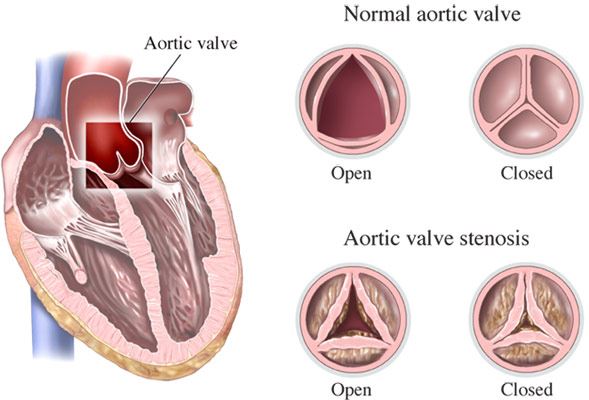Heart Valve Disease
The normal heart has two upper and two lower chambers. The upper chambers called “right and left atrium” collect blood flowing in from the body and in from the lungs. The lower chambers called “ventricles” collect blood from the atria then pump it forcefully out. The right ventricle pumps out to the lungs while the left ventricle pumps to the aorta.
The heart valves, which keep blood flowing in the right direction, are gates at the chamber openings. Each of these valves have flaps (cusps) that open and close once during each heartbeat. When the valves and chambers fail to move blood properly, heart valve disease occurs.

Medical Illustration Copyright © 2019 Nucleus Medical Media, All rights reserved.
Heart valve disease can affect all four heart valves:
Causes of Heart Valve Disease
Heart valve disease can be linked to congenital heart defects. However, other conditions, traits or habits may also play a role in raising your risk for this disease. These are known as risk factors.
Non-Modifiable Risk Factors: These factors are irreversible and cannot be changed. The more of these risk factors you have, the greater your chance of developing heart valve disease.
- As you age the shape or flexibility of your valve can change.
- Family history/genetics
Modifiable Risk Factors: These factors can be modified, treated or controlled through medications or lifestyle changes.
- Diabetes: When your blood glucose, also called blood sugar, is too high
- High cholesterol
- High blood pressure
- Obesity or having a body mass index “BMI” of 30 or greater
- Little to no physical activity
- Long history of cigarette smoking and/or drug abuse
Other conditions that contribute to the development of heart valve disease:
- Malignancy “cancerous” spread
- Endocarditis
- Autoimmune disease: a condition in which your immune system mistakenly attacks your body (e.g., lupus, rheumatoid arthritis and scleroderma)
- Radiation therapy
- Some diet medicines
- Cardiomyopathy
- Thyroid disease: a condition that is caused by the over or under function of the thyroid gland. The thyroid gland is an essential organ for producing thyroid hormones, which maintains the body’s metabolism
Symptoms of Heart Valve Disease
Many people with heart valve disease don’t have symptoms during the early stages of the disease. However, as the disease progresses, symptoms will begin to appear. Common signs and symptoms include:
- Chest pain
- Heart murmurs
- Heart palpitations
- Rapid weight gain
- Shortness of breath
- Swelling of the hands, feet or ankles
- Unusual fatigue
- Lightheadedness/fainting
Diagnosis of Heart Valve Disease
Heart valve disease is typically detected when your doctor discovers the presence of a heart murmur, enlarged heart, or fluid in lungs. This signals abnormal blood flow and prompts further evaluation. Your doctor confirms the diagnosis and may order several tests to diagnose your condition, including:
- Cardiac catheterization
- Computed tomography (CT scan)
- Magnetic resonance imaging (MRI)
- Echocardiogram (ECHO)
- Electrocardiogram (EKG/ECG)
- Stress test
Treatment of Heart Valve Disease
Treatment options depend on the severity of your condition, if you're experiencing signs and symptoms and if your condition is getting worse. Based on the findings, treatment options include:
Lifestyle Changes
- Eat a heart-healthy diet.
- Exercise under directions of your doctor.
- Avoid smoking.
- Avoid any strenuous activities.
- Practice good dental hygiene by flossing and brushing your teeth regularly.
- Make and keep appointments to see your doctor for routine check-ups and follow-up tests.
- Manage your stress.
Medications
- Antiarrhythmic medications will help control your heart’s rhythm.
- Diuretics “water pills” will help reduce amount of fluid retention in your body.
- Vasodilators will help lower your blood pressure and dilate and relax the blood vessels.
- Beta blockers will help reduce your blood pressure.
- Anticoagulants “blood-thinners” will help treat, prevent, and reduce blood clotting.
